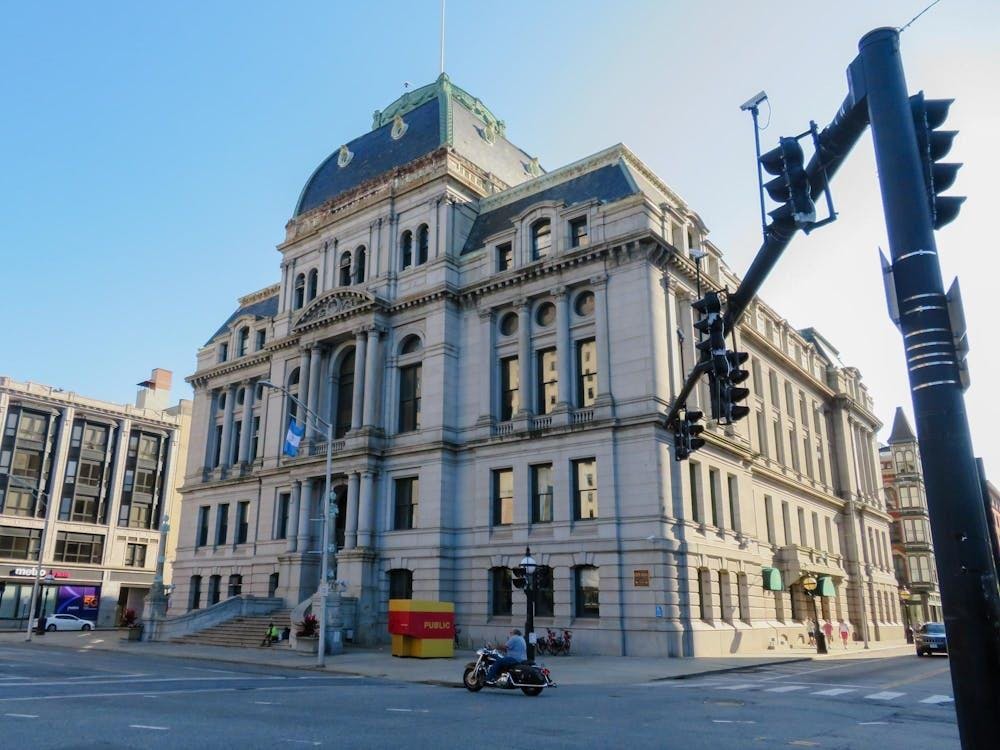When Christopher Bove became president of College Democrats of Rhode Island, he couldn’t help but notice the lack of political enthusiasm.
“I think organizing in this climate is really difficult,” Bove said. People no longer “have this insane kind of energy that you had after 2016.”
“That was my biggest experience running CDRI. I couldn’t get people to go to our events,”added Bove.
He attributes this, in part, to political apathy, noting that “the Democrats have a tendency to take our hold on R.I. for granted.” Vice President Kamala Harris and Senator Sheldon Whitehouse both won in races called shortly after polls closed Tuesday.
But “politics at the local level has always leaned conservative,” Bove said. He called attention to the state’s political make-up, whose Democratic majority has waned in recent years. Since 2016, Republicans have increased from 11.8% to 14.2% of registered voters, while Democrats fell from 40.6% to 37.7%.
Republican organizer Jess Marie identified the medical freedom movement — which sprung from the pandemic — as a major political turning point for her.
Drawing on her background as a healthcare worker, Marie has organized rallies against vaccination mandates and for pro-life policies. Recently, she’s been participating in pro-Trump rallies across the state.
“Rhode Island is heavily Democratic, I know this from my upbringing,” Marie said. “You would never know of anything else. How would you know unless you've explored?”
“There is still support for Trump here growing, and we are going to continue to work to show that there’s a different side of the political spectrum,” Marie continued.
Kenneth Naylor Jr. has made an effort to mobilize the state’s Republican minority through his role as President of R.I. Young Republicans.
“People want to talk about national issues in Rhode Island, but a lot of the issues that day-to-day Rhode Islanders (face) come right in their backyard, from their school committee or town council member,” Naylor said.
Much of his work focuses on identifying, platforming and empowering young conservative candidates to run for local office. “There is simply not enough youth in the room,” Naylor said, referring to a local GOP meeting in late 2019.
“Are we going to see a majority Republican leadership this year in Rhode Island? Probably not. Will we see it in 2026? Maybe not,” said Naylor. “But we want to keep growing our numbers.”
His advocacy has been mainly led by date-driven strategies, which has allowed the Republican party to “identify direct voters” and “new folks” for massive text blasts according to Naylor.
Marie employs a similar technological approach through social media group chats and pages, which has broadened her outreach throughout the state. “It’s finding people and inviting them, and we try to have another rally (scheduled) so that we can let people know,” she added.
Bove is not particularly worried about local conservative politics, noting that “this isn’t a new phenomenon.”
Jocelyn Foye, executive director of feminist nonprofit The Womxn Project, is exercising “trepidatious optimism” leading up to the election.
As a local progressive organizer, Foye feels “that Rhode Island is going to, at the federal level, protect the rights that we’ve fought for so long.” At the state and local level, she’s less certain.
“There's a lot of far-right organizing, and they’ve been doing it very quietly until last year,” Foye said.
Her nonprofit currently spearheads the Bodily Freedom Forever index, a data-driven initiative that tracks the stances of local elected officials on bodily freedom. She identifies this as a relatively novel strategy within Democratic spaces, which tend to neglect smaller, local offices.
“We’re going in and we’re saying, how do you rank people based on analytical data?” added Foye. Through its consolidation of social media posts, public comments and voting history, the BFFI hopes to empower voters by advocating for political transparency.
Foye lamented the way that local politics are often overshadowed during election season, but identified grassroots efforts as the core of The Womxn Project’s community work.
“I just think that government needs more everyday, real people,” Bove said. Like others, he has been doing local canvassing and phone banking to “get more younger, progressive people into municipal governments.”
“As far as grassroots, it's just getting right to the voters and knocking on doors,” Naylor said.
“Our power, our strength, is being as local as possible, because we’re only a state of 1.1 million,” Foye said. “So we think we can have an impact with a lot of this.”
Megan is a metro editor covering health and environment. Born and raised in Hong Kong, she spends her free time drinking coffee and wishing she was Meg Ryan in a Nora Ephron movie.





